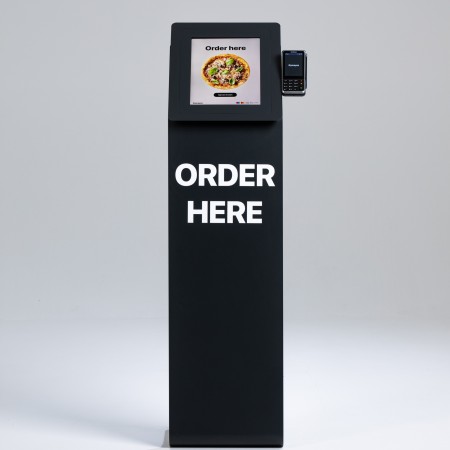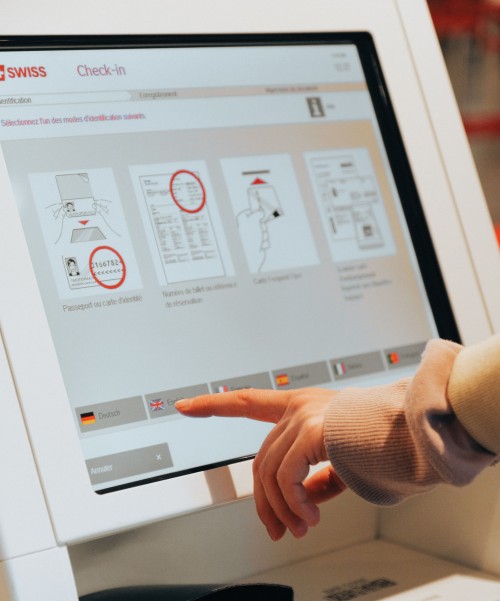
The benefits of self-service kiosks: increasing revenue and improving customer satisfaction
The benefits of self-service kiosks are increasingly acknowledged, and they are slowly taking over in different industries. The touchscreen kiosks allow you to independently order your own food at restaurants, have a contactless check-in at airports and hotels, help you find your way through enormous buildings, get a ticket at a train station, scan and pay for your items in retail stores, etcetera. They empower customers and visitors to do certain tasks autonomously.
The global self service kiosk market is expected to grow by 6.8% every year between 2023 and 2032. What are the reasons for the increasing popularity of self-service kiosks, and why are we slowly starting to see them everywhere? And also: how can they be beneficial for your company?
A lot of research has been done on the outstanding benefits of self-service kiosks and the value they add to customers and, subsequently, companies. Some businesses might shy away from purchasing self service kiosks due to the high initial investment, when in fact they can substantially increase revenue and improve customer satisfaction. The mechanisms behind these benefits are touched upon in this blog.

Increased profits with self serve kiosks
Self service kiosks can increase revenue for different businesses. This goes mainly for businesses using self service kiosks for selling products and services and digitizing the ordering process. The rise in profits is the result of both decreased costs and increased sales caused by the advanced characteristics of the interactive kiosks.
More customers and increased order value
During the ordering and selling process, employees use upselling techniques to incentivize customers to buy more. They make them aware of offers and the opportunity to expand their order with extra’s and upgrade their options. However, research shows that this upselling part is often neglected by employers for multiple reasons, such as long lines and fear of rejection.
Self-service kiosk software, however, is specifically developed in such a way that upselling is done throughout the entire ordering process. Additional options and deals are offered, constantly incentivizing and enabling customers to expand their orders. The visual aspect of the digital kiosks makes this incentive even stronger; marketing psychology is implemented in self service technology to make the upselling techniques as sophisticated as possible.
Self service technology is designed to upsell. This is reflected in sales numbers as well: in the food industry, customers spend 30% more money at self-service kiosks than at employees behind the desk. However, self service kiosks can be of added benefit beyond quick service restaurants as well. All industries could use it to incentivize their customers and visitors in some way. Think about self check-ins at hotels, where extra services can be offered, or ticket sale kiosks, that can offer insurance and seat upgrades. This sophisticated upselling technique is what generates more revenue in the end.

Additionally, self service kiosks ensure increased order throughput. Simpler: self service kiosks allow you to help more customers in less time. Because self service kiosks are designed to be fast and efficient, more customers can be helped, reducing waiting times and increasing sales for those who use them for selling and ordering purposes. Also, more attention can be drawn to customer loyalty programs, nudging them to become members and making it easier to retain valuable customers.
Lower operational costs and task relief for employees
On the other hand, self service kiosks can take over more pressing tasks and complex activities from employees and reception staff. They can use that valuable time for other important tasks. A self service kiosk can be a helping hand in more areas and industries than you think. Things like checking in, registering visitors, taking up orders, doing bookings, guiding the way, telling about the area, giving information, etc. can all be covered by self serve kiosks. This means businesses across numerous industries can implement self service kiosks to save resources and lower operational costs. This does not necessarily mean that employees will be erased from the working field and replaced by digital devices.
Businesses can also use self service kiosks as a tool to relieve staff of certain recurring tasks so they have more time for customers and visitors in other valuable domains.

A self service kiosk to increase customer satisfaction
A positive customer experience is of high importance to retaining valuable customers and visitors. Research shows that numerous characteristics of self service kiosks help improve customer service as well.
Speed and efficiency play a huge role in the customer experience. Self service kiosks allow visitors and customers to handle certain processes autonomously, providing quicker service to those who need it. This is important for time-conscious customers and visitors, but it can also be done the other way around. Some people prefer taking their time and walking through the steps slowly. Self service kiosks pose a solution for both target groups.
Another customer satisfaction factor is order accuracy, especially in the food industry. With self-service kiosks, the risk of human errors during order placement is minimized. Customers have the opportunity to review and confirm their selections before finalizing the transaction, ensuring they receive exactly what they want and expect.

Customization is a big advantage of self service kiosks as well. The magic of personalization can truly elevate the customer experience. Many interactive kiosks are equipped with smart technology that can offer personalized recommendations based on previous purchases or preferences. This tailored experience makes customers feel valued and understood by the brand, which increases customer engagement.
Self service kiosks are also able to break language barriers. In a global marketplace, catering to diverse customers is crucial. Interactive kiosks often offer multilingual options, making it easier for international or non-native customers to navigate the system comfortably. Breaking down language barriers enhances inclusivity and customer satisfaction.
Additionally, self service kiosks expand services beyond standard working hours. Self serve kiosks operate round the clock, thus allowing customers and visitors to be supported 24/7.
Last but not least, self service kiosks can drastically reduce waiting times. Efficient queue management is a critical factor in delivering a smooth customer experience. Self-service kiosks help reduce long queues during peak hours, creating a more pleasant experience for customers and visitors.
The key benefits of self service kiosks summarized
In this blog post, we covered the key benefits of self service kiosks. In short:
- More advanced upselling techniques
- Increased order throughput
- Heightened customer loyalty
- Lower operational costs
- Task relief for staff members
- Speed and efficiency
- Order accuracy
- Customization
- Breaking language barriers
- 24/7 service
- Reduced wait times
These eleven factors, all together, contribute to increased revenue and customer satisfaction across numerous industries.

Curious how self service kiosks can be beneficial for your company?
As mentioned before, businesses across numerous industries can benefit from the implementation of self service kiosks. Self service kiosks are designed to automate and improve certain work processes and relieve staff members from certain tasks, thereby lowering operational costs and improving the customer and visitor experience. This goes beyond the food industry as well, despite the fact that they are most often spotted there. Are you convinced that self service kiosks deserve a spot within your company too? Or are you wondering how they can be beneficial for your company? Get in touch with us!